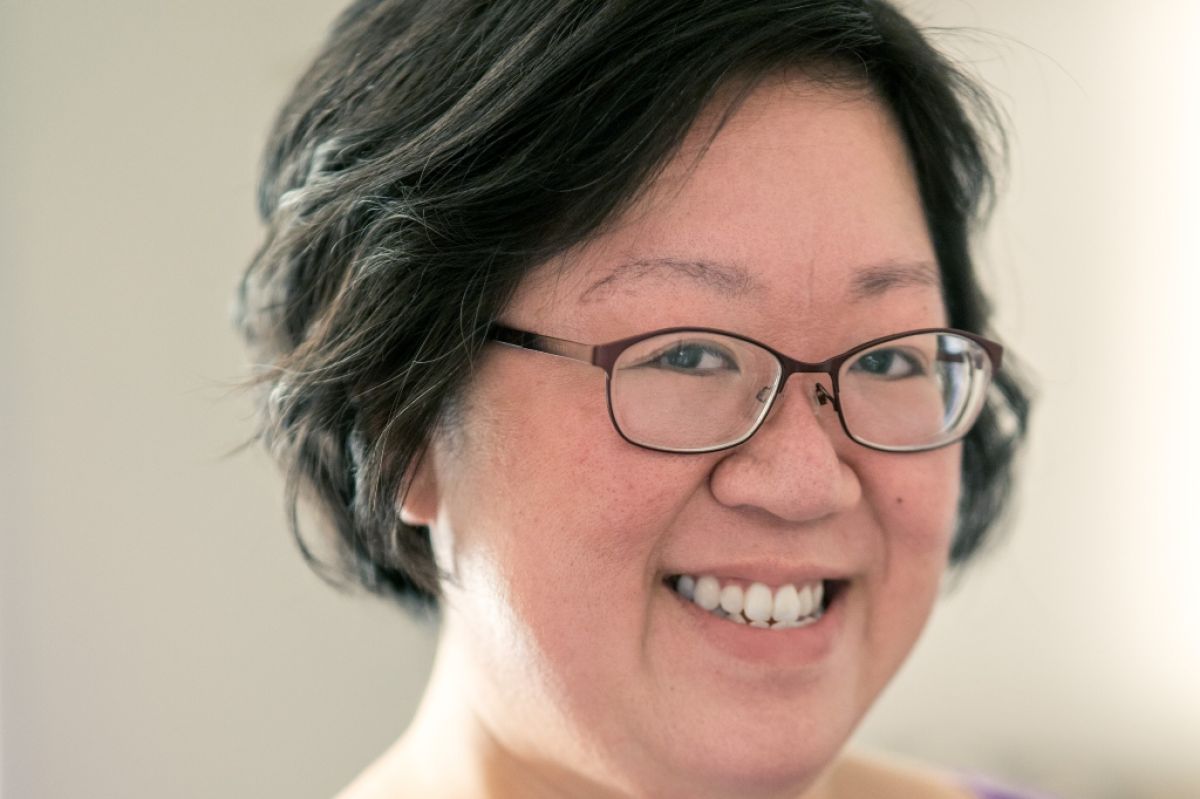[music]
"To be successful, you must be authentic and true to yourself."
-Lisa Kwong
A native of Radford, Virginia, Lisa Kwong is the author of Becoming AppalAsian. Her poems have appeared in A Literary Field Guide to Southern Appalachia, Still: The Journal, Pluck!, and other publications. She teaches Asian American Studies at Indiana University and English at Ivy Tech Community College.
Welcome to the Poets Weave. I'm Romayne Rubinas Dorsey. Lisa, what poems have you brought for us today?
An AppalAsian Finds Home in Bloomington, Indiana
I call myself an AppalAsian,
an Asian from Appalachia.
I rock leopard print and black stilettos,
write protest e-mails to Victoria’s Secret,
wear Brooks and flat foot proof orthotics.
After 5K brunch is a French Tickler,
a ham and cream cheese crepe,
mimosa with cherry. I victory-
dance in the basement stairwell
of Ballantine, break into song
upon hearing the word “lonely.”
I travel to Greece and Taiwan
vicariously through the men
I liked. I am from letting go
of the man who left for Florida.
I push up and bird dog,
lemon squeeze and tricep dip
as sweat hisses, every breath
a billowing kite lifting my body
higher and sorer.
I keep a flashlight
in the bathroom, just in case
I have to hunker down
in the bathtub
while a tornado blasts
through the parking lot.
I am from tea parties
and Scrabble, Pink Moscato
and Poeteers, exploding tacos,
chicken and dumplings.
I AppalAsian up this Midwest
college town, eat chicken feet,
mac-n-cheese, celebrate butts
and ancestors. I am from
a fridge covered in babies,
none of them mine,
postcards and handwritten poems
received via snail mail.
I ponder the mirror,
study the woman before me,
see the tear-stained tub of lard,
see the runner’s legs,
see the glittering, Cinderella
blue earring heart.
Searching for Wonton Soup
Nothing compares to Mom and Dad’s wontons, mini globes
of ground pork perfectly wrapped in a thin golden skin. But
I can’t live at home forever just to be fed. At every restaurant
in Bloomington, Indiana, I try to find a soup good enough:
broth not too oily, skin tender as the meat inside. I love
dozens of crisp scallions floating like emeralds, slick green
baby bok choy steamed just enough. I’ve been satisfied,
disappointed. Sometimes I wonder what the [heck] I just ate.
I hate going out to eat with complainers, even though we all can cook
better than what we pay for. Sometimes we don’t want to dice
vegetables, or we tire of flipping and stabbing meat with silver
thermometers. We just want to eat. Once in China, my father saw his mother
staring into a soup kitchen window crowded with customers scooping up
wontons and slurping broth, as steam rose to cloud the ceiling. She clasped
her hands behind her back, her face full of hunger. Seamstress money
wasn’t enough to buy bowls full of wontons for herself, her husband,
and six children. Dad tells me I don’t know struggle, not like they knew
in Tai Shan or when his feet first touched ground in San Francisco, when English
was a diamond locked in a glass case. I will never fully understand their poverty:
imprints on shoulders and hands from carrying buckets of water from a well,
cooking rice over open fire, living in a one room brick house with dirt floor, sleeping
in heat while mosquitoes siphoned their sweet blood. Now filled with gratitude, I know
there are worse things than bad wonton soup. Because they had little, my father
now prepares enough for an army in training: plates overflowing with beef, yu choy,
chicken, broccoli, and shrimp on every table. We fear hunger, fear necessities running
out, so we buy extra, cook extra, wonder: when will anything ever be enough?
You've been listening to the poetry of Lisa Kwong on the Poets Weave. I'm Romayne Rubinas Dorsey.







